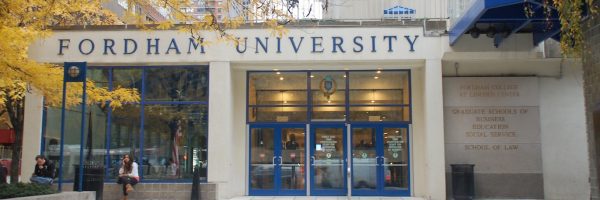Real Humans of the Rady School of Management MBA Program

In less than 20 years since opening in 2001, the University of California San Diego Rady School of Management has quickly cemented itself as one of the best up-and-coming business schools in California. Regarded as one of the 100 best business schools in the world by The Economist, with an impeccably strong and celebrated faculty, Rady has nurtured an increasingly excelling MBA class.

The Rady School of Business Class of 2019 MBA sported a gaudy median GMAT score of 670 and an undergraduate GPA of 3.21. These students also joined the program having amassed more than five years of professional work experience, on average, with numerous prospective graduates coming from well-known companies like: Intel Corporation, Loreal, Princeton University, and Scripps Health. As well, about 16 percent of students within the class joined the program having already earned either their Ph.D. or an additional Master’s degree.
Considering San Diego’s strong connection to the United States Armed Forces, it isn’t surprising to hear that many students in the Class of 2019 come directly from the U.S. Army, Navy, and Army. The Rady School of Management, along with many of UC San Diego’s additional graduate schools, show a concerted effort to bring in those with military experience, offering MBA fee waivers, as well help from an extensive network of school alumni that continue to work with the U.S. military.
But the Class of 2019, and the Rady School of Management itself, goes much deeper. With a budding entrepreneurial culture, students are coming in from all over the world to help build groundbreaking startup companies. In fact, more than 40 percent of the MBA Class of 2019 comes from outside the United States, utilizing Rady’s numerous startup resources, like the StartR Accelerator program, mystartupXX Accelerator, and the Rady Venture Club, among others.
To get a greater understanding of what it means to be a Rady MBA, and how the school continues to help develop a rich entrepreneurial foundation, we spoke with several current students, including a consultant from Bangalore, a software developer from Kolkata, and a local equine veterinarian hoping to build a “biotech and medical industry consulting firm in for both the human and veterinary market.”
Read on to see what’s in store for these students at Rady and what life after an MBA may look like.
Fordham Gabelli’s Checks In With Its Veterans in Global Leadership Fellows

The Gabelli School of Business at Fordham University recently highlighted a group of military veterans currently part of the school’s Veterans in Global Leadership (VGL) fellows program.
VGL was founded by Jayson Browder, a Fulbright scholar and a U.S. Presidential Management Fellow at the White House. Browder, PCS ’13, founded VGL with the intention to help “student veterans prepare and apply for prestigious internships, fellowships, and scholarships.”
Browder explains how a VGL program might make the difficult transition to civilian life a little more manageable for veterans: “[Vets] have implemented foreign policy abroad and have been tasked with solving complex problems. Now that they are back from the longest wars in our nation’s history, they’re looking to solve more problems and create an impact in their communities here in the states and abroad.”
After a 20-year stint in the Marines, VGL fellow Coleen Harper opted to major in nonprofit leadership at Gabelli. She founded D’ St. Aubyn’s Cause, which seeks to “diminish the rate at which veterans, single parents, and the elderly fall victim to homelessness.” Harper explains her motivation, saying, “My fears of becoming homeless were ignited as I proceeded through the process of retirement. This propelled me to make a difference rather than becoming a part of the problem. “A program like VGL can certainly help make an achievement more attainable.”
VGL fellow Robert Molina was an aviation logistics clerk in the Marines who now serves as communications chief of the Fordham Veterans’ Association as he completes a degree in political science and economics.
Fordham Veterans’ Association President Kevin Knightes arrived having previously served with that Hospital Corpsman Pharmacy Technician with the U.S. Navy for four years. He is now working toward an bachelor’s in Middle East Studies with minors in Arabic and Philosophy.
Of the VGL fellowship, Knightes writes, “I found that VGL aligned with my goal to continue service, but it will also introduce me to a vast network of like-minded people to share resources with.”
Jones School’s Veterans in Business Association Aids MBA Transition

The Rice University—Jones Graduate School of Business (Rice Business) recently highlighted its Veterans in Business Association (VIBA)—a unique student club that works to increase the number of veterans in Rice Business’s MBA program and bring a national awareness to their efforts—as part of a feature article in Rice Magazine.
VIBA was founded in 2011 by former Navy SEAL James Battista, who served for a decade in the military. The student organization aimed to provide mentoring opportunities for students making the challenging transition from military life to academia.
The following year, Rice Business dean Bill Glick, along with Rice trustees and others from the leadership team, began a scholarship that would help cover the cost of tuition, fees and living expenses for one veteran earning his or her MBA degree. This year, the recipient is Major William E. Lyles, a first-year MBA student at Rice Business who lost both of his legs after stepping on a buried improvised explosive device (IED) in Afghanistan. And while the transition from military to civilian life has not been an easy one for Lyle—including four years of rehab at the Brooke Army Medical Center in San Antonio—he nonetheless finds some overlap in the skills used in the Army and in an MBA.
“I wish I was still able to do what I did, but this is good, too.” Lyle told Rice Magazine. “I’m going to get a chance to lead again, in a different capacity.”
At Rice Business, special care is taken to consider the specific challenges facing veteran applicants. Annie Hunnel, Rice Business associate director of recruiting and admissions, travels across the nation to meet with potential students and help them understand how to transfer their military experience to the professional world.
With such an important focus placed on addressing the challenges of military applicants, Rice Business has quickly gained a reputation as one of the top veteran-friendly business schools in the country. “Rice valued my background in the military, and when I came down and got to meet some of the supporters, that clinched it,” former Green Beret Steve Panagiotou told Rice Magazine. “The support was almost overwhelming from alumni who have been successful in their careers. At that point it was a no-brainer for me.”
To read the complete Rice Magazine article, “The Next Mission,” click here.
